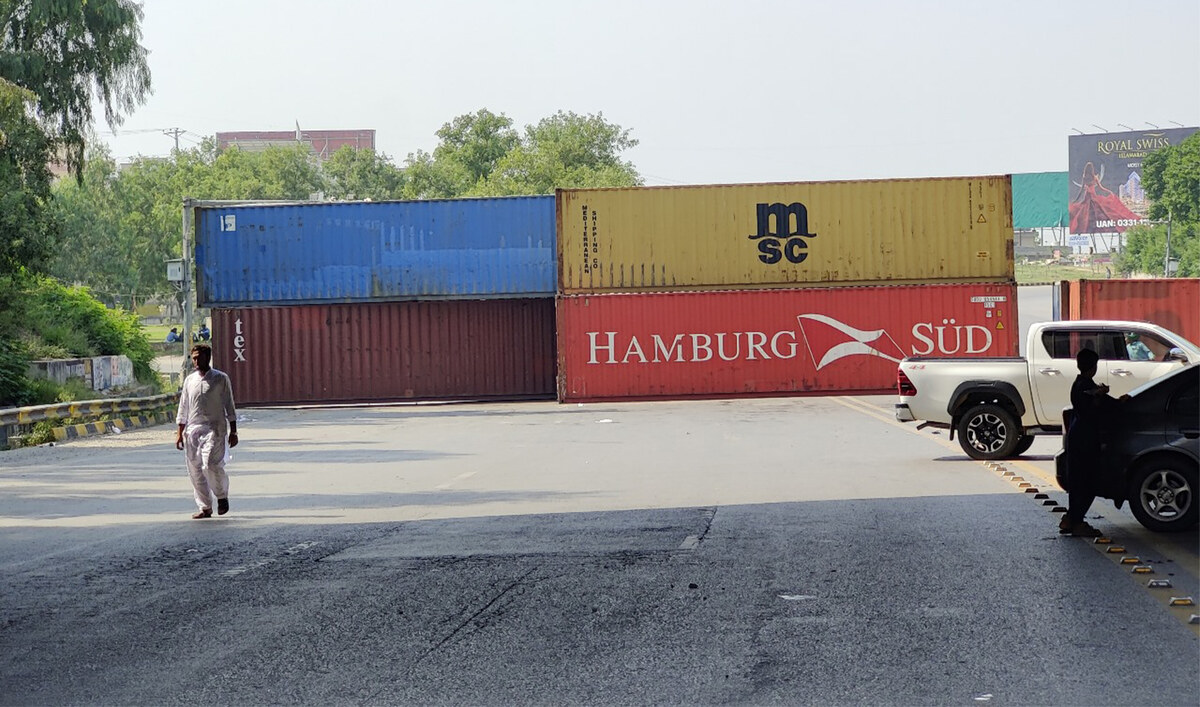ISLAMABAD: Police on Friday fired tear gas and arrested supporters of former prime minister Imran Khan’s Pakistan Tehreek-e-Insaf (PTI) party that is leading a demonstration in Islamabad as Federal Interior Minister Mohsin Naqvi said the government would not allow violent protests.
The PTI has been holding protests across several Pakistani cities this week against proposed constitutional amendments that it claims are aimed at curtailing the independence of the judiciary, a charge the coalition government of Prime Minister Shehbaz Sharif denies. The party is also trying to mobilize supporters through large public gatherings to put pressure for the release of Khan, who has been in prison since August last year and faces a slew of legal challenges.
On Friday evening, clashes erupted with police as PTI protesters tried to march toward the D-Chowk square where they were scheduled to hold the protest and police responded by firing tear gas. Pakistani local TV channels widely showed visuals of PTI supporters being arrested and reported that three policemen had been injured in clashes. Islamabad Inspector General of Police told media over 30 people had been arrested for violating Section 144 of the Code of Criminal Procedure, which allows the district administration to outlaw gatherings of more than four people on account of security threats. The ban was imposed in Islamabad as well as the cities of Lahore, Rawalpindi, Attock and Sargodha ahead of Friday’s protest.
The Punjab government also issued a notification saying it had summoned the paramilitary Rangers force “to maintain law and order” in Rawalpindi, Islamabad’s twin city. There was also paramilitary deployment at D-Chowk.
The PTI says the measures are being used by the federal and provincial Punjab government to suppress the party’s constitutional right to protest and to block the growing popularity of a party that has a track record of attracting hundreds of thousands of people to demonstrations and rallies.
Addressing a press conference, Naqvi accused PTI supporters of coming to the protest armed.
“They have a right to hold a rally but not the way it’s going on,” he told reporters. “It’s every Pakistani’s right [to protest]. If they want to voice their opinion they can, but this is not the way to do it. It’s wrong what they are doing, and we can’t give permission for this.”
He addressed issued caused to the public as mobile phone services remained shut in the federal capital through the day, and entry and exit points into the city as well as main highways and bridges inside were sealed. All roads leading to the Red Zone, which houses sensitive government buildings, and D-Chowk were shut from all sides.
“We have state guests here and also other delegations,” he said, referring to a visit this week by the prime minister of Malaysia and delegations from China and Saudi Arabia expected later this month as well as the Shanghai Cooperation Organization summit which Islamabad will host.
“Then we have teams of other heads of states that are arriving here. We have to ensure their security at every cost.”
ROAD CLOSURES
On Friday morning, an Arab News survey showed major roads inside Islamabad and Rawalpindi blocked off with shipping containers and long lines of traffic jams on main roads that connect the two cities. Even people on foot complained of not being able to travel.
“You don’t want people to come into the city [Islamabad] and get to D-Chowk where the protest is but at least let people go outside the city,” taxi driver Arshad Shad, who was on foot, told Arab News.
“Buses can’t move, there is no Internet, no mobile phone service. Families are stuck, they can’t come or go. So I don’t understand what the government is doing, they are only making life more difficult for the public.”
Zafar Iqbal, who deals in the sale and purchase of property, lamented frequent protests and their affects on businesses in the twin cities.
“Every fourth day there is a protest. This is very wrong. This shouldn’t happen. People’s businesses are getting affected and the public is being humiliated,” he told Arab News.
“This is a curse for the public, for businessmen. There is already no business and people are worried.”

Police block a street with shipping containers ahead of protests in Islamabad on October 4, 2024. (AN photo by Falak Mahmood Khan)
Asif Khan, a Rawalpindi resident who works with a bike ride-hailing service, criticized both the government and the PTI.
“This government has no shame, nor do the PTI people,” he said. “It’s been four hours, we have been sitting here since morning, but we didn’t get any passengers. What will the poor earn and eat?”
But in a message from Imran Khan posted on his X account by the PTI, he urged supporters not to be deterred by the obstacles.
“I want you all to reach D Chowk Islamabad today (Friday Oct. 4) for a peaceful protest and citizens of Lahore and its surrounding districts to prepare for a protest at Minar-e-Pakistan on Saturday Oct. 5,” Khan said.
“You should not be afraid of any kind of sacrifice for your freedom and do not retreat from it. Freedom is your right … Democracy and the rule of law have completely ended in our country, for which we have to fight hard.”


















